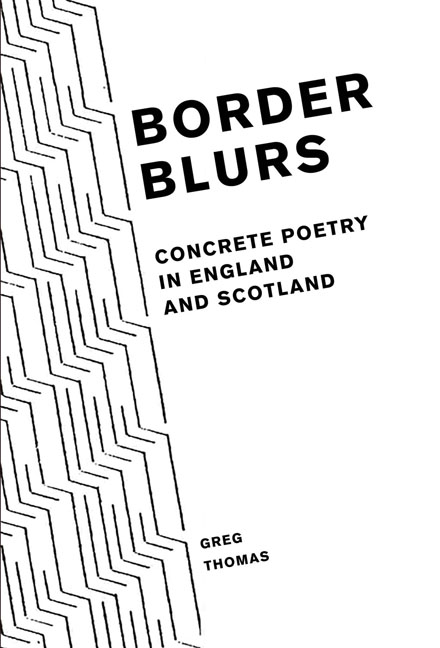Book contents
- Frontmatter
- Contents
- Dedication
- Figures
- Notes on Referencing
- Acknowledgements
- 1 Introduction
- 2 Concrete Poetry/Konkrete Poesie/Poesia Concreta: The International Scene
- 3 Order and Doubt: Ian Hamilton Finlay
- 4 Off-Concrete: Edwin Morgan
- 5 Apophasis: Dom Sylvester Houédard
- 6 Abstract Concrete: Bob Cobbing
- 7 ?Concrete Poetry and After: Conclusion
- Works Cited
- Index
4 - Off-Concrete: Edwin Morgan
- Frontmatter
- Contents
- Dedication
- Figures
- Notes on Referencing
- Acknowledgements
- 1 Introduction
- 2 Concrete Poetry/Konkrete Poesie/Poesia Concreta: The International Scene
- 3 Order and Doubt: Ian Hamilton Finlay
- 4 Off-Concrete: Edwin Morgan
- 5 Apophasis: Dom Sylvester Houédard
- 6 Abstract Concrete: Bob Cobbing
- 7 ?Concrete Poetry and After: Conclusion
- Works Cited
- Index
Summary
The Glaswegian poet Edwin Morgan coined the term ‘off-concrete’ in the subtitle of his poem ‘Canedolia: An Off-Concrete Scotch Fantasia’, composed on December 26–27, 1963, one of his earliest written in response to the new poetic style he had discovered the previous year through E.M. de Melo e Castro's letter. Across this chapter I use the term more broadly than Morgan perhaps intended, to evoke the character of his concrete poetry in general, which is defined not just by an enthusiastic receptiveness to early, northern European and Brazilian variants of concrete style but also by a certain recoil from some of its stricter imperatives. More specifically, the term indicates Morgan's tendency to combine concrete poetry’s typical compositional features – grid-based or visual syntax, exaggerated phonetic and grammatical patterning – with formal and thematic qualities that adapt them to specific communicative and descriptive tasks. Across the spectrum of Morgan's off-concrete styles, for example, we can posit a persistent desire to access worlds of cognition and communication beyond the conventionally human: from the minds of animals and computers to various extraordinary scenarios extending the boundaries of human thought and language itself, notably set in outer space. We can also sense, across the sweep of Morgan's concrete practice, an underlying interest in integrating characterised narrative voices into the concrete poem’s de-individuating syntactical frameworks. These voices are often polemical, sometimes intensely emotionally expressive, often engaged with issues of Scottish identity.
These tendencies – involving, in short, the integration of theme and narrative voice into the concrete poem – might seem so self-evidently necessary to the long-term viability of any poetic genre as to barely merit comment. But given the peculiar constraints of concrete poetics they do seem worth mentioning. Moreover, in Morgan's case these impulses are sufficiently mercurial in their expression – in terms of his movement between multiple voices and themes – to indicate a unique authorial temperament. As a whole, Morgan's poetry conveys the idea that the value of any poetic style is contextual rather than innate, dependent upon its ability to represent specific types or instances of communication rather than any implied quality of universal validity.
- Type
- Chapter
- Information
- Border BlursConcrete Poetry in England and Scotland, pp. 115 - 158Publisher: Liverpool University PressPrint publication year: 2019

